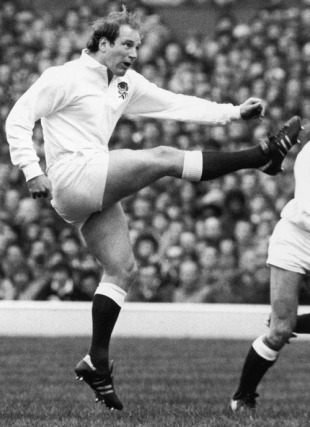- February 20 down the years
Hare inspires England

1982
England recalled 'Dusty' Hare yet again, and he responded with five penalty goals and two conversions, the second a beauty from the touchline. Clive Woodward scored the other try by running the ball the length of the pitch. The 27-15 win was one of England's best performances in Paris. But the real story was written at the post-match dinner. In front of them, the England players found bottles of aftershave as presents from the French RFU. Maurice Colclough, the big lock forward who played for a French club, thought it would be a jolly jape to empty his bottle and refill it with white wine, then stand up and challenge anyone to follow his head in downing the tempting fluid. One of the Marquis de Colclough's team-mates was a prop called Colin Smart - and with a surname like that, you just knew he was going to do something that wasn't. When he accepted the challenge, he thought Colclough's bottle still contained aftershave - and he knew his did. Before the banquet was over, he was in hospital with an original form of alcohol poisoning and the England selectors were formulating a letter warning their players about their future conduct. Smart recovered in time to play against Wales the following month.
1999
Jonny Wilkinson scored his first points for England. This was his fourth cap. He'd made his debut as an 18-year-old substitute, then gone on the 'Tour to Hell' and suffered 76-0 and 64-22 defeats in Australia and New Zealand. They obviously didn't scar him too much. Today at Twickenham, he played at centre but did the kicking for the first time, converting all three tries and adding a penalty. England needed his boot to be in good working order: they beat Scotland only 24-21.
2005
Leicester achieved the biggest win in any English Premiership rugby match, an 83-10 thumping of Newcastle Falcons, who had Mark Wilkinson at fly-half (his brother Jonny was out injured again). The Tigers scored 11 tries, all converted by Andy Goode, who was successful with 13 place kicks out of 13. Leicester also own the biggest win in the Heineken Cup, on November 1, 1997.
1952
The last British woman to win an individual gold medal at the Winter Olympics. Jeannette Altwegg wasn't the most daring ice skater of all time, but she traced her compulsory figures so well that her lead was unassailable. The balance didn't shift towards the free dance for many years later. Altwegg was world champion the previous year.
2002
British sledder Alex Coomber won bronze in the first women's skeleton event ever held at the Games. She finished third in both runs and 0.26 behind inaugural gold medallist Tristan Gale of the USA.
1963
Joakim Nyström was born. He helped Sweden win the Davis Cup in 1985 and 1987 and was Wimbledon doubles champion in the year between.
2002
At the Winter Olympics, Ole Einar Bjørndalen won all four gold medals on offer in the biathlon. The fourth, the relay today, was also his fifth gold in all - and the easiest of the lot. By the time he took over for the last leg, Norway were more than a minute ahead. He finished first despite missing three shots, breaking a ski pole, and falling down a slope!
1914
The amazing Bob Fitzsimmons fought his last fight. For want of another word. A no-decision six-rounder with Jersey Bellow in Pennsylvania. It was Bellow's only recorded bout! Fitz was 50 years old and the first boxer to win world titles at three different weights, including heavyweight which he was anything but. He didn't outlive his boxing career by much, dying of pneumonia in 1917.
1994
At the Winter Olympics in Norway, home favourite and speedskating ironman Johan Olav Koss pounded out the laps in the 10,000 metres to break his own world record by nearly 13 seconds. He'd also set world bests in winning the 1500 and 5,000. His third gold medal was presented by fellow Norwegian Hjalmar Andersen, who'd won the same three events at the 1952 Games.

1975
Ismael Kirui was born in Kenya. He was only 18 when he won the 5,000 metres in 1993, the youngest male athlete to win gold at any World Championships. He held off a finishing sprint by Haile Gebresilasie, retained the title two years later, then disappeared off the radar. His brother Richard Chelimo won silver in the 10,000 metres at the 1992 Olympics.
1966
Dennis Mitchell was born. When he won gold in the sprint relay in 2001, he was 35, one of the oldest world champions in track and field. He won four relay titles at the Championships spread over ten years, plus another gold at the 1992 Olympics, when he helped set a world record of 37.40. He was in the team that equalled that time at the 1993 World Championships, a time that wasn't broken until Usain Bolt & Co at Beijing in 2008. All well and good - until you hear that Mitchell admitted to injections of human growth hormone and tested positive for inordinate levels of testosterone (which explained his aggressive style of running). His excuse was one of the originals: he'd drunk six bottles of beer and had sex four times in one night. Nice try, but he was banned for two years.

